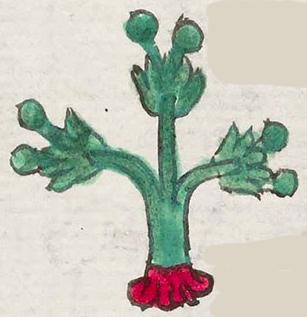Tzapotlan (Mdz13r)
This simplex glyph for the sapote (tzapotl) tree stands here for the place name Tzapotlan. This two-tone green tree with red, curling roots has a leader and two side branches. The foliage at the end of each branch are two protruding ball-shaped objects (the fruit) on short stems. The term for the fruit is tzapotl; in Book 11 of the Florentine Codex the tree is called a tzapocuahuitl. The locative suffix (-tlan, near) is not represented visually here.
Stephanie Wood
The tree here may be the "white sapote" tree, also known as the Mexican apple, with the scientific name Casimiroa edulis, although this supposedly has the Nahuatl name cochitzapotl, according to Wikipedia, so perhaps it is a variant. The same source mentions that the fruit contains histamines and that the Aztecs made poison from the seeds. There are various examples of the sapote tree in the Codex Mendoza. (See below, right.) In fact, the regular recurrence of this fruit in the collection is notable, suggesting it grows abundantly in central Mexico and/or has considerable cultural significance.
Stephanie Wood
çapotlan. puo
Tzapotlan, pueblo (Zapotlan, today)
Stephanie Wood
c. 1541, or by 1553 at the latest
Stephanie Wood
trees, branches, roots, árboles, ramas, raíces, fruits, frutas, nombres de lugares

tzapo(tl), https://nahuatl.wired-humanities.org/content/tzapotl
-tlan (locative suffix), place of, https://nahuatl.wired-humanities.org/content/tlan
"Zapote Place" [Frances Karttunen, unpublished manuscript, used here with her permission.]
"Where There Are Many Zapotes" (Berdan and Anawalt, 1992, vol. 1, p. )
"El Lugar de los Árboles Zapotes"
Stephanie Wood
Codex Mendoza, folio 13 recto, https://digital.bodleian.ox.ac.uk/objects/2fea788e-2aa2-4f08-b6d9-648c00..., image 36 of 188.
The Bodleian Libraries, University of Oxford, hold the original manuscript, the MS. Arch. Selden. A. 1. This image is published here under the UK Creative Commons, “Attribution-NonCommercial-ShareAlike 3.0 License” (CC-BY-NC-SA 3.0).







